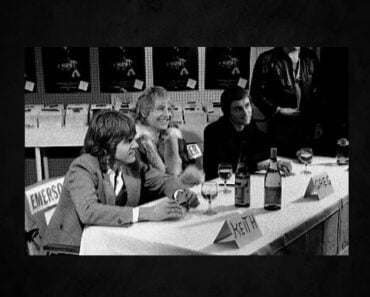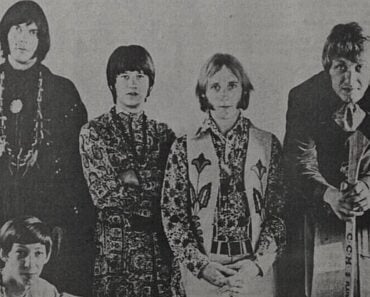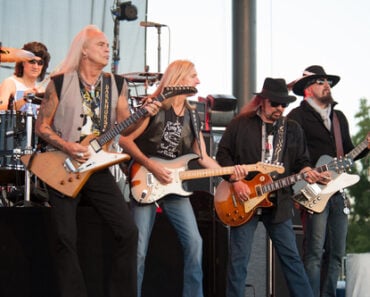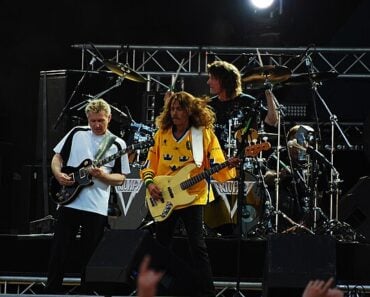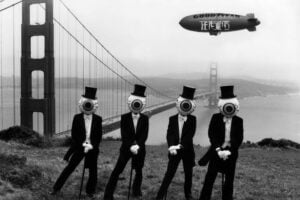
Feature Photo: A.PAES / Shutterstock.com
From the windy streets of Chicago emerged one of the most successful and influential funk bands of the 1970s, a group whose innovative sound and powerhouse vocals would reshape the landscape of soul and R&B music for generations to come. Rufus was an American funk band from Chicago, Illinois best known for launching the career of lead singer Chaka Khan, serving as both a launching pad for one of music’s greatest vocalists and a formidable musical force in their own right. They had several hits during their career, including “Tell Me Something Good”, “Sweet Thing”, “Do You Love What You Feel”, and “Ain’t Nobody”, establishing themselves as masters of groove-driven funk that seamlessly blended elements of rock, soul, jazz, and pop. Rufus and Chaka Khan were one of the most popular and influential funk bands of the 1970s; they had four consecutive number-one R&B albums, ten top 40 pop hits, and five number-one R&B singles among other accolades, demonstrating their remarkable ability to achieve both critical acclaim and massive commercial success.
The band’s origins can be traced back to the remnants of The American Breed, a Chicago group that had achieved success in 1968 with their hit “Bend Me, Shape Me.” In 1968, the American Breed (Gary Loizzo, guitar/vocals; Al Ciner, guitar; Charles “Chuck” Colbert, bass; and Lee Graziano, drums) had a top ten hit with the classic-rock single “Bend Me, Shape Me”. After their success, Colbert and Graziano (without Loizzo, who pursued a successful production career) created a new group adding later-day American Breed members Kevin Murphy (keyboards) and Paulette McWilliams (vocals) as well as James Stella (vocals), and Vern Pilder (guitar) from the bar band Circus. The group’s name evolved through several iterations, starting as Smoke, then becoming Ask Rufus, and finally settling on simply Rufus. This evolution reflected the band’s search for their musical identity, a quest that would ultimately be fulfilled when a young Chicago singer named Chaka Khan joined their ranks.
The transformation of Rufus from a struggling Chicago club band to international superstars coincided with Khan’s arrival and the development of their signature sound. From 1974 to 1979, Rufus released six platinum-selling albums including Rufusized, Rufus Featuring Chaka Khan, Ask Rufus, Street Player and Masterjam, establishing an extraordinary run of commercial and artistic success that few bands have ever matched. The band’s legacy extends far beyond their chart success, as they helped define the sound of 1970s funk while serving as a bridge between the classic soul of the 1960s and the sophisticated R&B that would dominate the following decades. Their influence can be heard in countless artists who followed, and their songs continue to be sampled, covered, and celebrated by new generations of musicians who recognize the timeless power of their groove-based approach to popular music.
Chaka Khan
Yvette Marie Stevens, better known by her stage name Chaka Khan, was born on March 23, 1953, and would become the most recognizable and successful member of Rufus, transforming both her own career and the band’s trajectory when she joined in 1972. Known as the “Queen of Funk”, her career has spanned more than five decades beginning in the early 1970s as the lead vocalist of the funk band Rufus, establishing her as one of the most powerful and influential vocalists in popular music history. In 1972, Graziano was replaced by Andre Fischer, a former American Breed drummer, and McWilliams was replaced by Chaka Khan (born Yvette Marie Stevens), a young female vocalist who had been providing background vocals as a session singer for the band before stepping into the frontwoman role when Paulette McWilliams departed for a solo career.
Khan’s impact on Rufus was immediate and transformative, her dynamic stage presence and powerhouse vocals becoming the centerpiece of the band’s identity. With the band she recorded the notable hits “Tell Me Something Good,” “Sweet Thing,” “Do You Love What You Feel,” and the platinum-certified “Ain’t Nobody,” establishing a string of successes that would define funk music for the decade. The band gained a reputation as a live performing act, with Khan becoming the star attraction, thanks to her powerful vocals and stage attire—which sometimes included Native American garb and showing her midriff. Her presence was so commanding that the band’s billing evolved from simply “Rufus” to “Rufus featuring Chaka Khan” and eventually “Rufus and Chaka Khan,” reflecting her growing prominence and star power.
Khan’s contributions to Rufus extended beyond her vocal performances to include songwriting and instrumental work. Khan has also been noted for being an instrumentalist playing drums and bass; she also provided percussion during her tenure with Rufus, demonstrating her versatility as a musician. Most of her compositions were collaborations with guitarist Tony Maiden, including their signature song “Sweet Thing,” which became one of the band’s most enduring and covered tracks. Despite her sometimes-acrimonious relationship with some of her bandmates, Khan and Maiden have maintained a friendship over the years, and their creative partnership produced some of Rufus’s most memorable material.
The tension between Khan’s solo aspirations and her commitment to Rufus became a defining characteristic of the band’s later years. After first putting it off as a rumor, Khan confirmed to media reports that she was going solo and signing a deal with Warner Bros. Records in 1978, beginning a complex period where she would simultaneously pursue solo success while occasionally reuniting with Rufus for albums and tours. Her debut solo album featured the number-one R&B hit “I’m Every Woman” (which became a pop hit for Whitney Houston), demonstrating her ability to achieve success independently. In 2001, Rufus (Kevin Murphy, Tony Maiden, Bobby Watson, Dave Wolinski, John “JR” Robinson) and Khan reunited for a brief tour, which Khan described in her 2003 autobiography, Chaka! Through the Fire. With Rufus, she achieved three gold singles, one platinum single, four gold albums, and two platinum albums, while her solo career brought three gold singles, three gold albums, and one platinum album with I Feel for You. Khan was picked as an inductee in the Musical Excellence category for the Rock and Roll Hall of Fame in 2023, recognizing her extraordinary contributions to popular music both as a solo artist and as the driving force behind Rufus.
Kevin Murphy
Kevin Murphy stands as the founding member and musical architect of Rufus, serving as the band’s primary keyboardist from its inception through its most successful period and beyond. Rufus began in Chicago with Kevin Murphy – the founding member a keyboardist from Minneapolis as an evolution of a renegade band of rock-n-soul musicians, positioning him as the creative catalyst who transformed the remnants of The American Breed into one of funk music’s most important groups. Born in Minneapolis, Murphy brought a diverse musical background to the group that would prove essential in developing their signature sound that blended funk, rock, soul, and jazz elements into a cohesive and commercially viable style.
Murphy’s role in Rufus extended far beyond just playing keyboards, as he served as one of the band’s primary arrangers, producers, and musical directors throughout their career. His keyboard work provided the harmonic foundation for many of Rufus’s biggest hits, and his understanding of both traditional R&B and contemporary funk helped the band navigate the changing musical landscape of the 1970s. Songwriters, arrangers and performers all, the members of Rufus co-produced their next album, Rufusized (1974 – ABC) with the late Bob Monaco before taking the reins completely for Rufus Featuring Chaka Khan (1975 – ABC), Ask Rufus (1977 – ABC) and Street Player (1978 – ABC), demonstrating Murphy’s crucial role in the band’s creative process and his ability to help guide their artistic development.
Throughout Rufus’s most successful period, Murphy remained a constant presence, adapting to the various lineup changes while maintaining the musical continuity that kept the band’s sound recognizable and cohesive. Keyboardist David “Hawk” Wolinski joined up with the band after a stint with Madura, thus complementing founding member Kevin Murphy’s playing as well, and this addition allowed Murphy to expand his arrangements and explore more complex musical territories. His collaborative approach to music-making was evident in the band’s spontaneous creative process, as these albums harness the essence of Rufus’ sound via songs that were composed spontaneously in rehearsals, with Murphy often serving as the musical glue that held these impromptu sessions together.
Even after Chaka Khan began her solo career and Rufus experienced various lineup changes, Murphy remained committed to the band and its legacy. In 2001, Rufus (Kevin Murphy, Tony Maiden, Bobby Watson, Dave Wolinski, John “JR” Robinson) and Khan reunited for a brief tour, demonstrating his continued dedication to the music and relationships that had defined his career. Legendary band Rufus label “funk band” does not begin to describe the multi-faceted musical legacy of Rufus, the ever-changing interracial group formed in the seventies that launched vocal superstar Chaka Khan, with Murphy’s foundational role making possible the creative environment that allowed such musical excellence to flourish. Today, Murphy continues to be recognized as one of the founding architects of 1970s funk, with his keyboard work and musical vision serving as a blueprint for countless musicians who followed in Rufus’s wake.
Tony Maiden
Tony Maiden emerged as one of the most important creative forces in Rufus, joining the band in 1974 as a guitarist and becoming a crucial songwriting partner with Chaka Khan during their most successful period. Los Angeles-born Tony Maiden former member of the band High Voltage and an international touring musician with the great Billy Preston, he brought considerable experience and musical sophistication when he was recruited to replace original guitarist Al Ciner. After seeing the original Rufus performing at the Los Angeles nightclub Maverick’s Flat, (where a young Maiden started his career) the group asked him to replace guitarist Al Ciner, based on his reputation as a fiery and seasoned player, positioning him to become an integral part of the band’s classic lineup.
Maiden’s impact on Rufus was immediate and profound, as his guitar work helped define the band’s sound during their most commercially successful period. Additionally, Tony Maiden and bassist Bobby Watson, who was also from Los Angeles, were recruited by drummer Andre Fischer. The trio’s addition to Rufus added a unique sound to the group, bringing a stronger funk and jazz influence to complement Khan’s now emerging powerful lead vocals. His playing style perfectly complemented the band’s rhythm section while providing the melodic counterpoint to Khan’s powerful vocals. The chemistry between Maiden and Khan extended beyond their musical partnership into a prolific songwriting collaboration that produced some of Rufus’s most enduring material.
The creative partnership between Maiden and Khan yielded some of the band’s most memorable and successful songs. Tony and Chaka’s signature song “Sweet Thing” – an often-covered million-seller that netted writers Tony Maiden and Chaka Khan an ASCAP Award in 1993 for its enduring popularity and airplay, demonstrating the lasting impact of their collaborative efforts. Most of her compositions were collaborations with guitarist Tony Maiden, and their songwriting partnership became one of the defining elements of Rufus’s sound during the mid-1970s. The success of “Sweet Thing” and other Maiden-Khan compositions helped establish Rufus as more than just a vehicle for Khan’s vocals, showcasing their ability to craft sophisticated and memorable songs that resonated with both critics and the public.
Throughout the various changes in Rufus’s lineup and Khan’s parallel solo career, Maiden remained one of the most consistent and dedicated members of the band. Despite her sometimes-acrimonious relationship with some of her bandmates, Khan and Maiden have maintained a friendship over the years, and their creative partnership continued even after the band’s initial run ended. Khan and Maiden reunited on the modernized Rufus medley “Pack’d My Bags”/ “You Got the Love”, on Khan’s double Grammy Award-winning 2007 album, Funk This, proving that their musical chemistry remained intact decades after their original collaboration. When discussing another potential reunion with Rufus during a 2008 interview with Billboard, Khan said that touring with Tony Maiden, one of the few Rufus band mates Khan kept a close friendship with, was the closest to another Rufus reunion, highlighting the special bond between these two crucial members. Reflecting on this incarnation of Rufus, Tony Maiden promises, “Even though Chaka Khan will not be present for this show, the music will remain absolutely organic. We have made every attempt to keep the music as close to what we played on the original recordings,” demonstrating his continued commitment to preserving and presenting the authentic Rufus sound for new audiences.
Andre Fischer
Andre Fischer served as Rufus’s drummer during their most crucial developmental period, joining the band in 1972 and playing a vital role in establishing the rhythmic foundation that would define their sound. Lee Graziano was replaced by Andre Fischer, a former American Breed drummer, marking an important transition as the band evolved from their earlier incarnation into the funk powerhouse they would become. Fischer’s drumming style brought a more sophisticated and groove-oriented approach that perfectly complemented the band’s increasingly funk-influenced direction, providing the rhythmic backbone that allowed Chaka Khan’s vocals and the band’s instrumental interplay to flourish.
Fischer’s tenure with Rufus coincided with their period of greatest creative and commercial success, as his drumming can be heard on many of their most important recordings. Additionally, Tony Maiden and bassist Bobby Watson, who was also from Los Angeles, were recruited by drummer Andre Fischer, demonstrating his role not only as a musician but also as a talent scout who helped assemble the classic Rufus lineup that would define their sound. His drumming was essential to hits like “Tell Me Something Good,” “Sweet Thing,” and other tracks that established Rufus as one of the premier funk bands of the era. Fischer’s ability to blend different rhythmic styles and his understanding of both rock and R&B sensibilities made him an ideal drummer for a band that was constantly evolving and experimenting with different musical approaches.
However, Fischer’s time with Rufus was marked by increasing tensions, particularly with Chaka Khan, that would eventually lead to his departure from the band. Despite the album’s success as well as a second successful major tour that followed, it still didn’t stop growing tensions within the group, particularly between Khan and longtime Rufus drummer Andre Fischer. The conflict reached a boiling point during the recording of “Ask Rufus” when personal relationships intersected with professional dynamics. Khan married Richard Holland during recording sessions of Ask Rufus, and Holland’s presence only made things worse between Khan and Fischer. During one session of Ask Rufus, Fischer got into a fight with Holland, who received help from Khan who counter-attacked.
Fischer’s departure marked the end of an era for Rufus, as he had been instrumental in establishing their classic sound. After a tour promoting Ask Rufus, Fischer finally left the group. He was followed by Nate Morgan. They were replaced by Richard “Moon” Calhoun and David “Hawk” Wolinski, respectively, ushering in a new phase for the band that would feature different personnel and a somewhat different musical approach. Despite the circumstances of his leaving, Fischer’s contributions to Rufus during their peak period remain essential to their legacy. When discussing another potential reunion with Rufus during a 2008 interview with Billboard, Khan said the band’s classic lineup, which includes Andre Fischer and Nate Morgan, had no plans on reuniting, acknowledging the importance of Fischer’s role in the band’s definitive era while recognizing that the personal conflicts that led to his departure made such reunions unlikely.
Bobby Watson
Bobby Watson joined Rufus as a bassist in 1974, becoming an integral part of the band’s classic lineup during their most successful commercial period. Additionally, Tony Maiden and bassist Bobby Watson, who was also from Los Angeles, were recruited by drummer Andre Fischer. The trio’s addition to Rufus added a unique sound to the group, bringing a stronger funk and jazz influence to complement Khan’s now emerging powerful lead vocals. Watson’s bass work provided the deep, groovy foundation that anchored many of Rufus’s biggest hits, and his understanding of both funk and jazz idioms helped the band achieve a more sophisticated musical approach that distinguished them from their contemporaries.
Watson’s bass playing was featured on many of Rufus’s most important albums, including “Rags to Rufus” (1974), “Rufusized” (1974), “Rufus Featuring Chaka Khan” (1975), and subsequent releases through the band’s peak period. His rhythmic partnership with the various drummers who played with Rufus created the solid rhythmic foundation that allowed the band’s melodic and harmonic elements to shine. The chemistry between Watson and the rest of the rhythm section was particularly evident on tracks like “Sweet Thing,” “Tell Me Something Good,” and other classics where his bass lines provided both the groove and the harmonic support that made these songs so memorable and enduring.
Throughout the various changes in Rufus’s lineup and the eventual pursuit of solo careers by key members, Watson remained a dedicated and consistent presence in the band. His commitment to the group extended well beyond their initial run of success, as he continued to participate in reunion tours and special projects. In 2001, Rufus (Kevin Murphy, Tony Maiden, Bobby Watson, Dave Wolinski, John “JR” Robinson) and Khan reunited for a brief tour, demonstrating his continued loyalty to the band and its musical legacy. This reunion allowed longtime fans to experience the classic Rufus sound with many of the original members still participating.
Even as other founding members stepped back from active touring, Watson continued to represent the Rufus legacy in various contexts. A lineup of Rufus including Bobby Watson and JR began a short tour in 2008. Neither founding member Kevin Murphy, mainstay Tony Maiden, nor Dave Wolinski participated in the tour, but Watson’s participation helped maintain some continuity with the band’s classic period. His dedication to preserving and presenting Rufus’s music demonstrates his understanding of the band’s importance in funk and R&B history, and his bass work continues to be studied and appreciated by musicians who recognize the crucial role of the rhythm section in creating the Rufus sound that influenced generations of performers.
Dave “Hawk” Wolinski
David “Hawk” Wolinski joined Rufus in 1977 as a keyboardist, vocalist, and arranger, bringing fresh creative energy to the band during a period of transition and helping to craft some of their most memorable later material. Keyboardist David “Hawk” Wolinski joined up with the band after a stint with Madura, thus complementing founding member Kevin Murphy’s playing as well, creating a powerful dual-keyboard setup that expanded the band’s harmonic possibilities and allowed for more complex arrangements. His addition came at a crucial time when the band was dealing with lineup changes and seeking to maintain their creative momentum in an evolving musical landscape.
Wolinski’s most significant contribution to Rufus came through his songwriting, particularly his composition of “Ain’t Nobody,” which would become one of the band’s most enduring and successful songs. The album included four Khan-led studio songs, including the Dave Wolinski composition “Ain’t Nobody”, which got attention when a producer for the film Breakin’ heard it while screening songs for the movie’s soundtrack. WB eventually released the song (with the billing Rufus and Chaka Khan) and the song became a top 30 Billboard Hot 100 hit, reaching number one on the R&B chart and was number eight on the UK Singles Chart. The success of the track led to the band receiving its second Grammy Award for Best R&B Performance by a Duo or Group with Vocals, establishing Wolinski as a crucial creative force within the band.
Beyond “Ain’t Nobody,” Wolinski made significant contributions to other important Rufus material and helped shape their sound during the late 1970s and early 1980s. He’s the pen behind “Do You Love What You Feel” and “Ain’t Nobody”, demonstrating his ability to craft both dance-oriented funk tracks and more sophisticated R&B material that showcased the band’s versatility. His work as an arranger and additional keyboardist allowed Kevin Murphy to explore different aspects of his playing while Wolinski handled much of the harmonic complexity that characterized Rufus’s later material. Also former member Dennis Belfield returned to co-write “Everlasting Love” with Wolinski and Murphy, showing his collaborative approach to songwriting and his ability to work effectively with both new and former band members.
Wolinski remained connected to Rufus through various reunion projects and continued to be recognized as an important contributor to their legacy. In 2001, Rufus (Kevin Murphy, Tony Maiden, Bobby Watson, Dave Wolinski, John “JR” Robinson) and Khan reunited for a brief tour, with Wolinski’s participation helping to ensure that the band’s later material was properly represented in their live performances. However, by 2008, neither founding member Kevin Murphy, mainstay Tony Maiden, nor Dave Wolinski participated in a subsequent tour, as various members began to step back from active performing. Despite his relatively shorter tenure with the band compared to some other members, Wolinski’s contributions, particularly “Ain’t Nobody,” have become central to Rufus’s legacy and continue to influence contemporary artists who sample and cover this enduring classic.
John “JR” Robinson
John “JR” Robinson joined Rufus as their drummer in 1978, replacing Richard “Moon” Calhoun and bringing his considerable skills as one of the music industry’s most respected session musicians to the band during their later period. In April 1978, Calhoun was replaced by John “JR” Robinson as the group’s drummer, marking another significant change in the band’s rhythm section as they continued to evolve their sound and adapt to the changing musical landscape of the late 1970s. Robinson’s arrival coincided with a period when Rufus was exploring more sophisticated production techniques and incorporating elements of disco and contemporary R&B into their established funk foundation.
Robinson’s drumming style brought a more polished and studio-oriented approach to Rufus that complemented their increasingly sophisticated arrangements and production values. His extensive experience as a session musician had given him the ability to adapt to different musical styles and work effectively with various artists, skills that proved invaluable as Rufus navigated the complexities of maintaining their identity while pursuing commercial success. Robinson’s technical proficiency and musical versatility allowed the band to explore new rhythmic territories while maintaining the groove-based foundation that had always been central to their appeal.
Throughout his tenure with Rufus, Robinson played on several important recordings and became an integral part of their live performances. His drumming can be heard on albums like “Masterjam” (1979) and other later Rufus releases, where his playing helped support both Chaka Khan’s continuing involvement with the band and their attempts to maintain relevance as musical tastes shifted toward disco and contemporary R&B. Robinson’s ability to blend traditional funk drumming with more modern production techniques made him an ideal drummer for a band that was constantly seeking to balance their established sound with contemporary trends.
Robinson’s commitment to Rufus extended well into the reunion era, as he continued to participate in various projects and tours featuring the band’s classic material. In 2001, Rufus (Kevin Murphy, Tony Maiden, Bobby Watson, Dave Wolinski, John “JR” Robinson) and Khan reunited for a brief tour, with Robinson’s participation helping to ensure that the band’s later material was properly represented alongside their classic hits. A lineup of Rufus including Bobby Watson and JR began a short tour in 2008, demonstrating his continued dedication to the band’s legacy even as other founding members stepped back from active performing. Robinson’s contributions to Rufus, while coming during their later period, helped maintain their musical standards and provided the rhythmic foundation for some of their final classic recordings, ensuring that the band’s evolution continued even as their classic era drew to a close.
Later Members and Alumni
Throughout Rufus’s evolution from their origins as remnants of The American Breed to their peak as one of funk’s most important groups, numerous musicians contributed to their sound and helped shape their legacy. The early incarnation featured several musicians who laid the groundwork for what would become the classic Rufus sound. Before founding a new band, originally called Smoke, with vocalists Paulette McWilliams and James Stella, guitarist Al Ciner, bassist Chuck Colbert, drummer Lee Graziano, and keyboardist Kevin Murphy had all been in the band at one point or another, with these early members helping to establish the musical foundation that would support Chaka Khan’s eventual arrival and the band’s transformation into a funk powerhouse.
During the transitional period of the early 1970s, several important musicians passed through the Rufus lineup, each contributing to the band’s developing sound. Ron Stockert served as a keyboardist/vocalist and was particularly influential during the band’s early years, providing much of the artistic direction before Khan’s role expanded. Ron Stockert was still the guiding force when the band signed with ABC in 1973, and he lent a more pop/rock flavor to the group’s self-titled debut, released later that year. However, shortly after this album’s release and struggling with the group’s slow climb to success, Stockert would leave the band during sessions of the group’s next album, Rags to Rufus, as the focus began to shift more definitively toward Khan’s talents. Dennis Belfield served as bassist during the early period, contributing to the band’s development before being replaced by Bobby Watson as the band moved toward their classic funk sound.
The band also featured keyboardist Nate Morgan, who joined around the time of their breakthrough and played an important role in several key recordings. Ciner and Belfield left the group shortly thereafter along with Stockert who was replaced by keyboardist Nate Morgan, based in Los Angeles, bringing West Coast musical influences that helped broaden the band’s appeal. Morgan’s tenure with Rufus included some of their most successful period, but he eventually left the band along with Andre Fischer during the tensions that marked the late 1970s. He was followed by Nate Morgan. They were replaced by Richard “Moon” Calhoun and David “Hawk” Wolinski, respectively, ushering in the final phase of the classic Rufus era.
The band’s later period saw various configurations as members pursued solo careers and reunion projects. Richard “Moon” Calhoun served as drummer briefly in the late 1970s before being replaced by John “JR” Robinson, while various other musicians contributed to recordings and tours during the 1980s and beyond. The band recorded Numbers (which went #15 R&B and 49 on the Pop chart) in (1979 – ABC), the first of three albums without Chaka that also includes Party ‘Til You’re Broke (1981 – MCA) # 19 R&B & Pop #67. “Seal in Red ” #57 R&B, and #64 Pop (1983 – Warner Bros.), demonstrating the band’s ability to continue creating music even without their most famous member. These later incarnations, while not achieving the commercial success of the classic lineup, helped preserve the Rufus legacy and provided opportunities for the remaining members to continue exploring their musical vision while honoring the foundation that had made them one of funk’s most important and influential groups.
Check out more Rufus articles on ClassicRockHistory.com Just click on any of the links below……
Top 10 Rufus Songs
Read More: Artists’ Interviews Directory At ClassicRockHistory.com
Read More: Classic Rock Bands List And Directory




